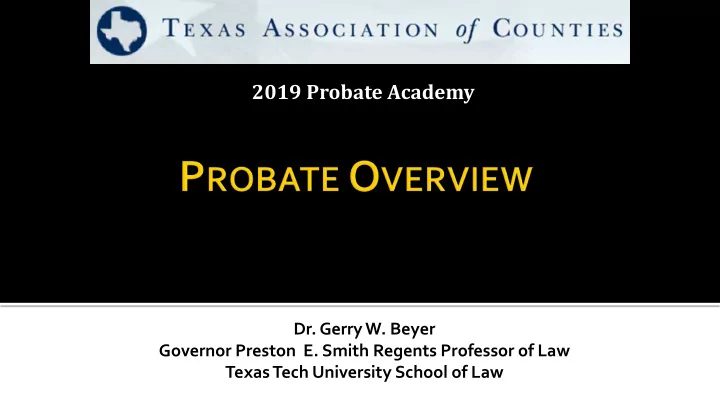

2019 Probate Academy Dr. Gerry W. Beyer Governor Preston E. Smith Regents Professor of Law Texas Tech University School of Law 1
2
3
4
1. Title Transfer Prove the identity of the new owners of the decedent’s probate property: ▪ Heirs, if intestate ▪ Beneficiaries, if testate 5
Non-Probate Property Joint tenancies with survivorship rights ▪ Bank accounts ▪ Real property ▪ Automobiles Pay-on-death designations ▪ Bank accounts ▪ Retirement funds, pensions, annuities, etc. ▪ Life insurance Other arrangements ▪ Inter vivos trusts ▪ Transfer on death deeds ▪ Transfer on death motor vehicle titles ▪ Community property survivorship agreements 6
2. Creditor Payment 7
Personal representative: Executor or Executrix = will Administrator or Administratrix = intestate Must be appointed by a court. 8
Legal Requirements Not incapacitated Not a convicted felon Not a non-resident of Texas ▪ Allowed if person appoints resident agent to accept service of process. Not a corporation not authorized to be a fiduciary in Texas Not a person the court finds “unsuitable” 9
1. Determine if Decedent Left a Will Home and office ▪ Search carefully – testators often “hide” wills Safe deposit box ▪ Texas has accelerated access method to allow access to look for will, life insurance policies, and burial plot deed. Significant individuals ▪ Family members, friends, drafting attorney Clerk of the court 10
2. A person with standing begins the process Administration does not automatically happen. ▪ Heir ▪ Will beneficiary ▪ Named executor ▪ Creditor ▪ “Good Samaritan” to prevent waste to the estate Prepares and files application. Pays filing fee. 11
3. Proper Notice Clerk of Court gives notice according to applicable law. Most often, just posting on the court house door or a nearby bulletin board. Other methods may be required (e.g., probate after four years of death, unable to produce original will) ▪ Publication ▪ Mail ▪ Personal service 12
4. Hearing Court conducts hearing on application. ▪ Determines validity of will, or ▪ Determines that decedent died intestate. Court appoints personal representative unless: ▪ Muniment of title. ▪ Determination of heirship only. ▪ Abbreviated [e.g., small estate affidavit] Court determines type of administration ▪ Dependent ▪ Independent [most common] 13
5. Personal representative qualifies Takes oath of oath. Posts bond ▪ Unless testator waived it ▪ Unless the personal representative is a corporation. Obtains letters testamentary (if will) or letters of administration (if intestate) from clerk. 14
6. Personal representative gives notices To will beneficiaries. To creditors. ▪ Secured ▪ Unsecured 15
7. Personal representative collects and preserves the decedent’s probate property. Only probate assets. Beware of the “Tomb Raiders” and “Vulchers” 16
8. Personal representative prepares inventory, appraisement, and list of claims (of affidavit in lieu thereof). File with court within 90 days of appointment. Court reviews and approves (or not). ▪ If independent administration, rest of process is outside of court supervision unless someone complains. 17
9. Manage decedent’s property Must do so in a fiduciary capacity ▪ No self-dealing. ▪ Avoid conflicts of interest. 18
10. Certain property is protected from most creditors Homestead Exempt personal property Family allowance 19
11. Personal representative pays claims according to a detailed priority order specified in the Estates Code. 20
12. If dependent administration, personal representative makes reports to the court on status of administration, typically annually. 21
13. If property remains after paying creditors, personal representative distributes to heirs or beneficiaries. 22
23
1. Express language in the will ▪ “To the extent permitted by law, no action shall be had in any court exercising probate jurisdiction in relation to the settlement of my estate other than the probating and recording of my will and return of any required inventory, appraisement, and list of claims of my estate.” ▪ “I appoint [name] to be independent executor.” 24
2. By agreement of all recipients of the decedent’s property ▪ Will beneficiaries ▪ Intestate heirs 25
Court may waive bond Even if will did not provide for bond waiver Even if decedent died intestate 26
Once inventory, appraisement, and list of claims (or affidavit in lieu thereof) is filed and approved, no further court action is needed unless someone “complains.” 27
Annual accounts are not needed. Interested person may demand accounting from personal representative after 15 months. If PR not comply within 60 days, suit is possible. Interested person may petition court to force PR to account and distribute after two years. 28
29
Except for a few minor things (e.g., pay taxes and insure property), personal representative must: Ask the court for permission to do something. Court conducts hearing. Do the act (assuming court approves it). Ask the court to approve what was done. 30
Examples of things personal representative will petition court to do: ▪ Setting apart exempt property ▪ Homestead ▪ Exempt personal property ▪ Family allowing ▪ Selling estate property. ▪ Paying debts. ▪ Approving annual accountings. ▪ Distributing to beneficiaries. ▪ Approving PR compensation. 31
32
Recommend
More recommend